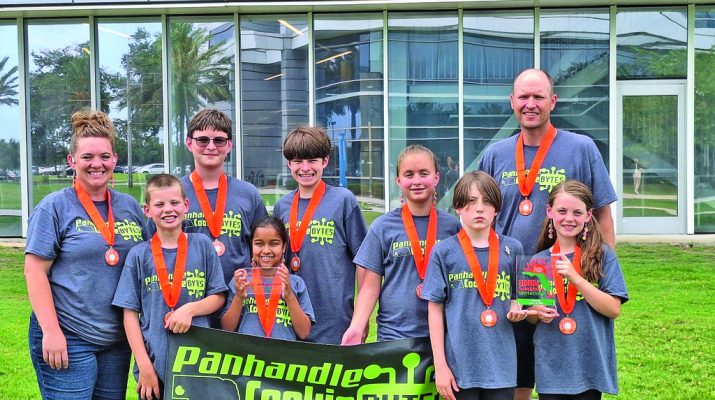Brightly colored robots sat under colorful banners with team names heralding the owners, Legoborci z Oravy, Sumrall NanoBots, and Panhandle Cookie Bytes. The teams and their robots were among 50 national and international teams gathered for the inaugural FIRST Lego League Florida Sunshine Invitational from June 19-22 at the Embry-Riddle Aeronautical University in Daytona Beach, Fla.
The Panhandle Cookie Bytes, a rookie team of Scotts Bluff County 4-H youth ages 9 to 14, took second place at the 2024 Nebraska FLL contest qualifying for the invitational. In Florida, the team ended up in the Top 10, at the invitational, which only gives out one Champions Award, which went to team TSKY from Japan.
“First of all, they were a rookie team, and it’s almost impossible for a rookie team to make it this far,” said Natalie Creech, co-leader of the Panhandle Cookie Bytes. “We’re grateful for the teams who preceded us, and we could model what they’ve done.” Many of the teams, including the champions from Japan, were from around the world, Saudi Arabia, Australia, the Czech Republic, and the Republic of Moldovia. In the United States youth age out of Lego League at 15, but the International Lego League allows for teams to have members up to 18 years.
The diversity of the leagues didn’t phase the Cookie Bytes. They explored other team projects, such as soccer, reptiles, and scented Legos, picking up tips and various ways the teams built their robots.
“One thing they took away from the Japanese team was numatics, which is basically like using air pumps,” Creech said. “The kids really liked the idea and in the future, I’m sure Cody (Creech, co-leader of the group) will be focusing on it for our robots.”
A challenge in Florida, was the humidity, not something the Panhandle Cookie Bytes ever considered when building a robot in the arid Great Plains. “In the humidity, the robot wheels stuck to the robot game board. The solution we came up with was to use baby powder on our wheels,” she said. This allowed some traction on the board, allowing the robot to move as the team had coded it to complete the missions.
The Cookie Bytes were also paired up with an “Alliance” team from Ohio. They helped each other out and got to know each other. On the last morning, the two teams ran their robots together in the Alliance Games. “We had practiced well together. They took part of the board, and we took part to complete missions. It’s just like a tournament with double elimination,” Creech said. When the teams practiced, everything went well. “When we got on the real boards, it didn’t seem like anything went right. In their second round things came together, but there weren’t enough points to carry us on, but it was fun.”
As a young team, the Panhandle Cookie Bytes grew a lot in a short time. “I was very impressed with how they treated other teams, their interaction, and how much they’ve grown in their skills. For some of them, having to present or having to talk to other people about their project or their robot was terrifying for them. We’ve been working on those skills with games I created, and the team was able to present confidently and had ownership of their project,” Creech said.

